There are musics I avoid writing about out of too much respect. It’s a sort of mental stuttering mechanism, I guess – I have so much to say that it all gets choked, like seven hyperactive adolescents trying to get on a bus all at once. Nonetheless, this week we’re going to take a whack at one of our very, very favorite pieces of music from a very specific angle, hoping to avoid that logjam.
The Band, “The Band”. AKA ‘The Brown Album’.
I guess there are people in the world for whom those words fail to resonate. But you flash that brown cover in front of any denizen of the Woodstock universe, and you’ll conjure the seminal moment when modern Western culture changed direction.
Before The Band you had Janis Joplin tearing out her heart piece by piece, Jimi Hendrix burning and smashing, and The Rolling Stones wreaking all sorts of mayhem.
And then you had “John Wesley Harding”, “The Basement Tapes” (in retrospect), “Music from Big Pink” and “The Band”. Acoustic, introspective, holy, humble, organic. Together they whispered a hushed “Stop.” Strap yourself to a tree with roots. Unplug. Get back to where you once belonged.
Every time I go into an organic supermarket I hear ‘Across the Great Divide’. Every time I see a family wearing cotton and riding bicycles I hear ‘Up on Cripple Creek’. Every time I just stop and concentrate on breathing clean air, I hear ‘Rockin’ Chair’.
A little background for those who weren’t there: The Band, comprised of four Canadians and an Arkansan, had been touring bars and clubs throughout rural North America for a dozen years as The Hawks when Bob Dylan picked them up to back his provocative shift from acoustic topical and poetic songs to raucous electrified loudness. For two entire years they ran, toured, took drugs and suffered booing from the audiences.
Then Dylan crashed his motorcyle and they retreated together to a Big Pink house in the Saugerties in upstate New York, playing very old and very new music in the basement, bootleg tapes of which began to leak out and were released officially only years later. Then Dylan recorded the seminal “John Wesley Harding” and The Band recorded their first album, “Music from Big Pink”, two albums that introduced an acoustic mindset to an entire generation.
Dylan went on to get weird (as is his wont) in “Nashville Skyline”. The Band toured extensively, now to cheers, and in 1969 stopped to record their masterpiece, one of the very finest works to come out of the greater Rock genre, “The Band”, or ‘The Brown Album’.
Flash forward. Their next album, “Stage Fright”, had several great cuts, but was mostly strained. They recorded four more studio albums together over the next eight years, none really worth remembering. In 1978, they gave themselves a good-bye bash, filmed by Scorcese, starring the Rock Hall of Fame. It’s their best-known work. Do yourselves a favor: go back to “The Band”, listen to it a thousand times, and discover more beauty and passion and grace in every successive listening. Let it enrich you.
Much has been written about the album’s cultural impact and aesthetic achievement. Eric Clapton heard it and decided on the spot that Cream’s music was no longer relevant. Elliott Landy’s photo shoot at Big Pink has become an integral visual correlative of the music of “The Band”. All the photos here are his.
Levon Helm: It was a complicated record. We wanted to make one that you didn’t really get until the second time you played it. Some of the songs, like “Rockin’ Chair”, sound like folks playing accordion and mandolin on the back porch of some farm… There was nothing normal about it. The title we had for the record was “Harvest”, because we were reaping this music from seeds that had been planted many years before we’d even been born. But we could have called it “America” as well, because this music was right out of the air. We were saying, “Listen! You can’t ignore this.”
For our SoTW, we’re going to pick on one of the utter gems, ‘Rockin’ Chair’. It’s ostensibly written (like most of the album) by Robbie Robertson, though other members of the band say they had a larger role in composing the songs than is indicated in the credits. Here’s a fascinating clip, Levon and producer John Simon and George Harrison and others talking about the recording of ‘Rocking Chair’, especially the vocals.
The song is the narrative of an old sailor longing to retire back to Virginia, to sit on the porch with his buddy Ragtime Willie. That’s all. Nothing too profound, you might say, and you’d be right, looking at it out of context. But set against the background of Vietnam and Altamont and “Rape, murder, it’s just a shot away”, it spoke loudly and profoundly in its quiet simplicity: Hey. Stop. Look. Listen. Think. Embrace the world around you.
I think of The Band as the only rock group that achieves the internal richness of jazz. Rock is based on straightforward 4/4 tempo with the backbeat (1/2/3/4) conventionally driven into your ears by the drums (underscored by a bass and a rhythm guitar both playing the 4/4 rhythm). It’s a beat that makes you dance.
‘Rockin’ Chair’ employs in the verse an acoustic lead guitar, an acoustic rhythm guitar, a mandolin, an accordion, a fretless bass and Richard Manuel’s wonderful lead vocal. The chorus uses one acoustic guitar, the bass, the accordion and three voices in tight harmony. It should be noted that while their standard line-up was Robbie Robertson on guitar, Levon Helm on drums, Garth Hudson on keyboards, Richard Manuel on rhythm piano and Rick Danko on bass, they frequently rotated. Manuel would play drums while Levon played mandolin, etc. On this album, they all played honky-tonk horns.
If you tap your foot, you’ll have no trouble following the 4/4 rhythm. Put on your headphones and try to find what instrument is giving you that rhythm. Guess what? In much of the song, none. The rhythm is a function of the interplay between the instruments. Like in fine jazz. Music that respects space, air, silence. It’s an implicit beat that allows you to suck on your corncob pipe and watch the sun set slowly over the Shenandoah Mountains.
It’s miraculous, it’s mature. There’s no other rock music like it.
Here’s a video of a live performance of the song that shows how great the original is, in contrast. Compare the three elegant acoustic guitar riffs following the chorus in the original to Robbie’s obvious electric guitar here. Compare Richard Manuel’s lead vocal, so relaxed and authentic in the original, pushing just a bit too much here. Even Garth Hudson, who so rarely displays lapses in taste, tries too hard on the accordion in the live version.
The Band’s ‘Rockin’ Chair’ grew from ‘Rocking Chair’ by Hoagy Carmichael (1899-1981), one of the great composers of Standards, including ‘Stardust,’ ‘Georgia on My Mind,’ ‘Up the Lazy River,’ ‘The Nearness of You,’ ‘Heart and Soul,’ and ‘Skylark’ (here’s SoTW 195, all about the song), Here’s his 1930 version of ‘Rocking Chair’ with his 11-piece ‘orchestra’ including Bix Beiderbecke, cornet; Tommy Dorsey, trombone; Benny Goodman, reeds; Gene Krupa, drum. Here’s his 1956 version, to which The Band’s version is much more closely akin. Just for fun, here’s Eric Clapton’s version.
Lest you miss the connection, the last line of The Band’s song is a quote from Hoagy’s (“Old rocking chair’s got me”). The Band wasn’t touting its own originality. On the contrary, it was touting its debt to The Tradition.
“The Band” had a profound timeliness for 1969. As Robbie Robertson said, “It felt like a passport back to America for people who’d become so estranged from their own country that they felt like foreigners.” But it also has a purity and timelessness, a music that evokes respect for what went before, a modesty and gravitas and resonance rare in popular art. The album is a gift
Hang around, Willie boy, don’t you raise the sails anymore.
It’s for sure, I’ve spent my whole life at sea,
And I’m pushin’ age seventy three,
Now there’s only one place that was meant for me.
Oh, to be home again down in Old Virginny
With my very best friend, they call him ‘Ragtime Willie’.
We’re gonna soothe away the rest of our years,
We’re gonna put away all of our tears,
That big rockin’ chair won’t go nowhere
Slow down, Willie boy, your heart’s gonna give right out on you.
It’s true, and I believe I know what we should do
Turn the stern and point to shore
The seven seas won’t carry us no more
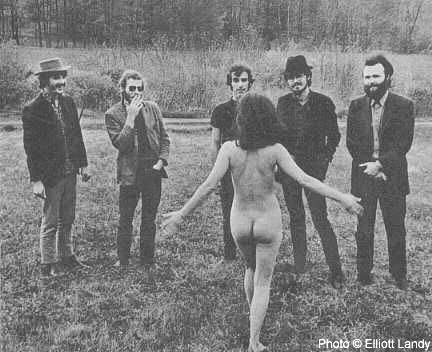
Hear the sound, Willie boy, the flyin’ Dutchman’s on the reef
It’s my belief, we’ve used up all our time
This hill’s to steep to climb
And the days that remain ain’t worth a dime
I can hear somethin’ callin’ on me
And you know where I want to be
Oh Willie don’t you hear that sound
Oh to be home again down in Old Virginny
I just want to get my feet back on the ground
Oh to be home again down in Old Virginny
I’d love to see my very best friend
They call him ‘Ragtime Willie’
I believe old rockin chair’s got me
Oh to be home again…
If you enjoyed this post, you may also like:
126: Bob Dylan, ‘Tears of Rage’ (The Basement Tapes) 127: The Band, ‘Tears of Rage’ (“Music from Big Pink”) 049: Chrysalis (J. Spider Barbour), “Summer in Your Savage Eyes”, a fabulous tale about the house Big Pink.
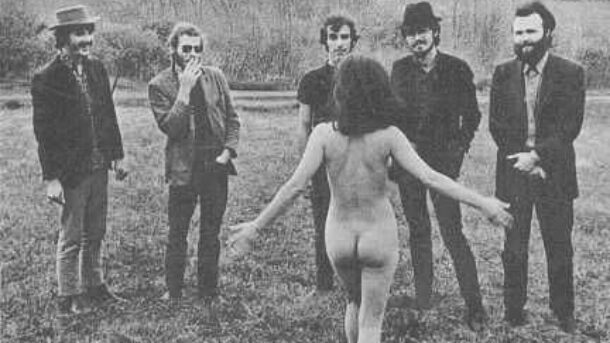
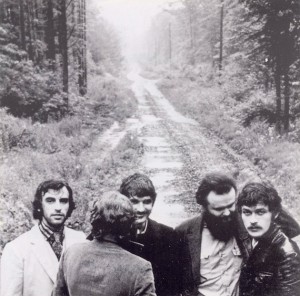
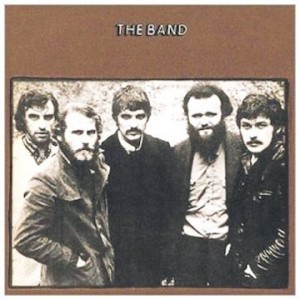
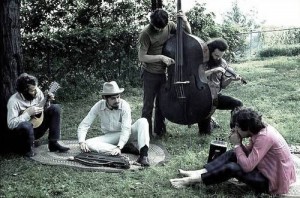
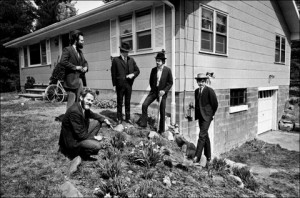
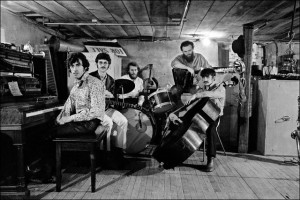
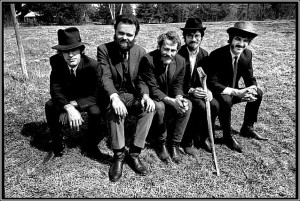
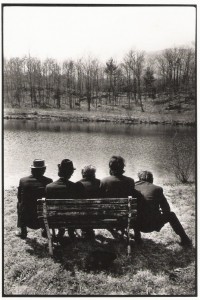
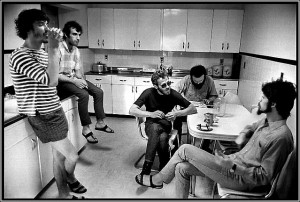
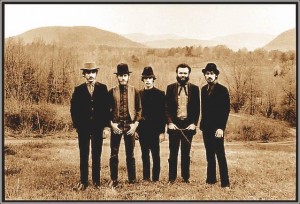


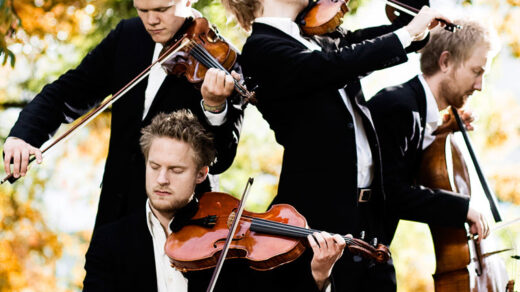
I liked The Band but I never thought of them as seminal. Sounds like you only liked one of their albums and weren’t blown away by The Last Waltz (everybody raved but I wasn’t either).
Best part of this posting (on a quick read, I admit) was the info about Hoagy Carmichael. I read the other day that Rock Around The Clock was written by a guy who was born in 1893, Max Freedman (see Mark Steyn: http://www.steynonline.com/6264/rock-around-the-clock )
PS: I’m pretty sure I saw the Band at Varsity Stadium as part of a multi-act festival. If I remember correctly, they were very late and it was a cold, grey day and I would have liked to leave before they came on.
I was thinking it was Labour Day and it looks like I was right: http://rockrarecollectionfetish.blogspot.ca/2011/08/band-varsity-stadium-toronto-canada-2nd.html
I think The Youngbloods played too but I can’t be sure.
Jeff, I haven’t posted a comment in a long time (though I read the blog often). I want to thank you for this great post on “The Band.” I resonate with your respect for this music. I have a special playlist on my iTunes called “The Heart of the Collection” (out of my 1700 albums–all genres) that includes at the very center the first two albums by The Band, “The Basement Tapes,” and “John Wesley Harding.” Just saying yeah, I get it. Will listen to “The Band” again tonight. Cheers.
Have always thought their 1st two
albums the most important in my collection
from Bill Hailey to Phish. If I could have only
one from all, it would be “The Band.” It is
the definitive distillation of rock to me.
i learn so much from you, Jeff!
Jeff, I was thinking that in many ways your essays are a work of art.
This was wonderful. Almost sublime
I’m back 9 years later for a second comment. Robbie Robertson died two days ago and The Forward’s starndard “Secret Jewish History of [every celebrity]” finally makes sense. Robbie’s biological father was, apparently, a Jewish gangster in Toronto. His mother was a Mohawk. His apparent father was Mr Robertson who was away in the army when Mrs Robertson conceived Robbie. She later divorced Robertson because he was abusive but the biological father had already died in a car accident.
“His mother introduced him to his father’s family, including his father’s brothers, Natie and Morrie Klegerman, who were prominent members of Toronto’s Jewish underworld. “They brought me into their world with tremendous love and affection,” recounts Robertson, who would occasionally do “errands” for his uncles”.
This was his uncle’s funeral: https://hebrewbasicburial.ca/ServiceDetails.aspx?sid=3647&fg=1&AspxAutoDetectCookieSupport=1
https://forward.com/culture/444583/how-robbie-robertson-learned-he-was-jewish-and-the-son-of-a-gangster/
Ha! Thanks for this – you had me at the title. Because Hoagy.
Phil Wood, born/raised in Indiana, my boss at the factory decades ago, was a brilliant, hyper-curious and knowledge-besotted person who championed among many other things the culture of his native state. He could quote poetry by Jame Whitcomb Riley for hours, but his favorite Indianan clearly was Hoagy Carmichael. Phil hunted down an obscure recording of Hoagy’s symphony when there were few people who knew he’d even composed one. But the thing about Hoagy is the thing about the Band. Grounded in place, and evoking it. The lyrics often feel as if they are natural midwestern rural speech, full of words and phrases one might not hear in Manhattan, but are everyday parts of life in Knightstown, where Phil grew up. And the music often sounds like evening drifting into night, but not quite still, as the cicadas begin to shut down, then the steady but softer crickets take the stage with a background chorus of peepers, before being moved aside by katydids…
Phil, on one of his few nights on the town, spoke with Billy Philadelphia about all things Hoagy a few times. Billy is a Hoagy fiend too, and continues the tradition.
Wonderful piece — thank you, Jeff. I just shared it on Facebook, and of course, the picture with the naked woman is what popped up on my post. Let’s see how long it takes FB to give me a warning. 😉
Weirdly, I’ve played “Big Pink” and “Stage Freight” much more often than the Brown Album. I’ll have to do something about that.
BTW, that video clip was fascinating. I’d never considered the Staples Singers’ influence, but it now seems obvious.
The Band, collectively, are the chief example of good recording artists who consistently ended up in the wrong place at the wrong time. They latched
their talents on several honest recording artists and then detached themselves—never realizing their true potential because they never “realized” what
that potential was. Not deciding whether or not their strength was as a group or as individuals contributed to their malaise. They were not only non-
influencers but they rejected the influence of others. That conceit kept them from real success and lead to drugs and a gradual slide to oblivion. As far
as Hoagy Carmichael—I am now aware of the diversity of his recording and writing prowess—a true genius.
My goodness Jeffrey from one Jeffrey to another you have once again channeled my thoughts exactly, as another Jeffrey of the same generation and apparently background,
I won’t comment further since it would be duplicative of what you have already written, and if it tried to be original it would just be a riff.
Except to say that if you are anything like me Jeffrey you will want to be nudged to correct the spelling on Richard Manuel, :=)